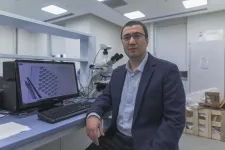(Press-News.org) In a new study led by Johns Hopkins Medicine, the drug RK-33 has demonstrated promise in treating breast cancer that has spread to the bone (breast cancer bone metastasis). RK-33 was previously shown to help treat other types of cancer and viral illnesses.
Patients with breast cancer and bone metastasis have limited treatment options and often rely on palliative care to ease difficult symptoms, including frailty and pain. In most cases, breast cancer with bone metastasis is incurable.
Now, corresponding author Venu Raman, Ph.D., and his team say they have developed a potential novel treatment that is specific to breast cancer bone metastasis and can successfully work in the bone microenvironment, which is often resistant to therapeutics. Their latest study, first available online Sept. 30 in Cancer Letters, builds off Raman and colleagues’ previous work with RK-33. The drug targets and inhibits the protein DDX3, which is found to be elevated in cancer cells.
“One of our main queries was whether RK-33 could be effective for treating bone metastasis, based on previous lab findings that showed its effectiveness in suppressing breast cancer growth,” says Raman, professor of radiology and radiological science and pharmacology at the Johns Hopkins University School of Medicine. Raman is also a member of the Johns Hopkins Kimmel Cancer Center. “We first had to determine whether DDX3 was expressed in patient samples of breast cancer bone metastasis, and we found DDX3 was expressed at high levels in these samples.”
DDX3 is an RNA helicase — a type of protein that that unwinds genetic material called RNA. This unwinding activity regulates various functions in tumor or cancer cells, including facilitating the translation of RNA’s genetic code into proteins. The DDX3 protein’s role in this process promotes growth of cancer cells, contributing to the spread of the disease. Studies conducted by Raman’s team and others indicate that RK-33, a drug developed in Raman’s lab, can prevent these functions of DDX3. As a result, it can slow down cancer progression by controlling cancer cell growth and proliferation.
After determining that breast cancer bone metastasis cells had high levels of DDX3, the research team turned to mice to test if RK-33 had any effect on the DDX3 protein and function of the cancer cells. Researchers first treated a group of mice that had breast cancer bone metastasis with RK-33. Imaging of these mice following the treatment then confirmed that RK-33 appeared to eliminate all evidence of bone metastases, while also preventing the cancer cells in the bone from “seeding” (spreading) to other organ systems — a common occurrence in bone metastasis. Such findings indicate that RK-33 was able to successfully target, halt the growth of and fully eliminate breast cancer bone metastasis cells by inhibiting DDX3 and successfully penetrating bone microenvironments that often block other therapies.
RK-33 also showed promise in preventing breast cancer bone metastasis from occurring in the first place. Mice with breast cancer that had not spread to bone received the drug, and researchers observed the cancer never developed into bone metastases. Researchers also did not observe any significant adverse reactions to RK-33 in their experiments.
“This is a unique research opportunity because this is not the classical investigation into tumor suppressors or oncogenes,” Raman says. “We have demonstrated DDX3’s involvement in aggressive cancers and how RK-33 represents a significant advancement in utilizing targeted therapies for cancers that currently lack specific treatments.”
Researchers say this study moves them closer to clinical trials for RK-33. They plan to continue investigating the drug’s ability to treat other conditions and DDX3’s role in several other diseases.
Additional authors who contributed to this work are Paul Winnard Jr., Farhad Vesuna, Guus Bol, Kathleen Gabrielson and Paul van Diest of the Johns Hopkins University School of Medicine, Georgia Chenevix-Trench of the Royal Brisbane Hospital and Natalie ter Hoeve of the University Medical Center Utrecht Cancer Center (Bol and van Diest are also affiliated with the Utrecht Cancer Center).
Funding for this study was supported by the Flight Attendant Medical Research Institute.
END
Experimental cancer drug eliminates bone metastases caused by breast cancer in lab models
The drug, RK-33, also prevented cancer cells in the bone from spreading to other body parts
2024-10-15
ELSE PRESS RELEASES FROM THIS DATE:
Political candidates who fight climate change stand to benefit in election
2024-10-15
A majority of Floridians expressed support for political candidates who fight climate change in a new Florida Atlantic University survey. The survey found that nearly 52% of respondents agreed that a candidate with a record of reducing climate impacts was more likely to get their vote.
The Invading Sea’s Florida Climate Survey also revealed strong support in the state for increasing renewable energy use and teaching climate science in K-12 classrooms. The survey is the 11th conducted by the FAU Center for Environmental Studies ...
Stand up to Cancer announces new grants supporting pioneering research in six cancer types
2024-10-15
LOS ANGELES – Oct. 15, 2024 – Stand Up To Cancer® (SU2C) today announced grants to several teams of leading cancer investigators in support of cutting-edge research in a variety of cancers including head and neck, pediatric, pancreatic, breast, rectal and gastro-esophageal cancers, as well as research focused on how the microbiome communicates with the immune system.
“These new grants emphasize SU2C’s support of collaborative, trailblazing research that pushes the field forward and helps people impacted by some of the most common or difficult-to-treat cancers,” said Julian Adams, Ph.D., president and CEO of SU2C. “With an emphasis on answering ...
Researchers awarded $1.3M to help military Veterans battling Acute Myeloid Leukemia
2024-10-15
CLEVELAND—With a new four-year, $1.3 million grant from the U.S. Department of Veterans Affairs, researchers at Case Western Reserve University are investigating a new approach to treat Acute Myeloid Leukemia (AML) in military Veterans.
AML is the most common form of blood cancer in adults, and many patients suffer relapses—especially Veterans, due to exposure to harmful chemicals and radiation during active duty, according to the National Center for Biotechnology Information.
There is no effective treatment for AML and, according to the National Institutes of Health, half of treated patients suffer a relapse after therapy—mainly ...
New hub for high-energy astrophysics — CTAO Science Data Management Centre opens at DESY in Zeuthen
2024-10-15
Zeuthen, Germany – On 14 October 2024, the Cherenkov Telescope Array Observatory (CTAO), along with hosting partners and shareholders Deutsches Elektronen-Synchrotron DESY, celebrated the official inauguration of the Science Data Management Centre (SDMC) on the DESY campus in Zeuthen, Germany.
The ceremony, chaired by Prof. Christian Stegmann, Head of DESY Zeuthen, was opened by Mario Brandenburg, Parliamentary State Secretary at the German Federal Ministry of Education and Research (BMBF), and Tobias Dünow, State Secretary at ...
JMIR publications CEO and Executive Editor Gunther Eysenbach achieves #1 ranking as most cited researcher in Medical Informatics for fifth consecutive year
2024-10-15
Toronto, ON (October 14, 2024) – JMIR Publications is proud to announce that Gunther Eysenbach, founder, CEO and executive editor, has once again been named the #1 most cited researcher in the subfield of medical informatics by Stanford/Elsevier’s Top 2% Scientists rankings. This marks the fifth consecutive year that Dr Eysenbach has secured this prestigious position, reaffirming his status as a leading authority and driving force in the field. He is also ranked #36 in the Top 100 Scientists in Information & Communication ...
ERC grant for groundbreaking wearable health tech
2024-10-15
Dr. Levent Beker from the Department of Mechanical Engineering at Koç University, once again received European Research Council (ERC) support for his scientific research that focuses on improving the quality of our daily lives.
His previous project on an implant that can detect signs of heart failure and degrade in the body without surgery was granted €2.5 million Starting Grant from the ERC. Last year, his research on a wireless micro sensor that enables real-time monitoring of food spoilage at supermarkets, was published in Nature FoodMagazine.
Currently leading the Bio-integrated ...
NIH announces winners of prize competition to improve postpartum maternal health and health equity through innovative diagnostics
2024-10-15
The National Institutes of Health (NIH) has announced the winners of the Rapid Acceleration of Diagnostics Technology (RADx® Tech) for Maternal Health Challenge, an $8 million prize competition to encourage development of postpartum maternal health diagnostics for use in regions that have limited access to maternity care. The eight winning teams developed home-based and point-of-care diagnostics, wearables and other accessible technologies to improve postpartum health outcomes during the period when most maternal deaths occur—up to one year after delivery or the end of ...
APS and SPR honor Dr. Cynthia F. Bearer with the 2025 Mary Ellen Avery Neonatal Research Award
2024-10-15
October 15, 2024 – The American Pediatric Society (APS) and the Society for Pediatric Research (SPR) are pleased to announce Cynthia F. Bearer, MD, PhD, as the 2025 Mary Ellen Avery Neonatal Research Award recipient. This award honors a pediatric investigator who has made important contributions to neonatal health through basic or translational research.
Dr. Bearer is the William & Lois Briggs Chair of Neonatology and Chief, Division of Neonatology, Rainbow Babies & Children’s Hospital and Professor of Pediatrics & Neurosciences at Case Western Reserve University. ...
Election delays and voter trust
2024-10-15
A pre-registered survey of nearly 10,000 Americans shows that delays in declaring the winners of elections cause distrust in the electoral process, but that reassuring voters before polls close that delays are normal can prevent this distrust from taking root. National elections in the United States were not definitively settled for days after election day in 2020 and 2022. There are legitimate reasons for such delays, including state rules about when counting can commence and laws about whether mailed ballots postmarked on election day must be counted. However, delayed results ...
US air pollution monitoring network has gaps in coverage, say researchers
2024-10-15
The lack of air-quality monitoring capabilities across the U.S. affects the health of millions of people and disproportionately impacts minority and low socioeconomic-status communities, say researchers in ACS’ Environmental Science & Technology Letters. Motivated by a new U.S. Environmental Protection Agency (EPA) standard for air pollution, the team employed a model for fine-scale air pollution mapping using real-world data, and it indicates there is an urgent need to address gaps in the agency’s monitoring ...
LAST 30 PRESS RELEASES:
Antipathy toward snakes? Your parents likely talked you into that at an early age
Sylvester Cancer Tip Sheet for Feb. 2026
Online exposure to medical misinformation concentrated among older adults
Telehealth improves access to genetic services for adult survivors of childhood cancers
Outdated mortality benchmarks risk missing early signs of famine and delay recognizing mass starvation
Newly discovered bacterium converts carbon dioxide into chemicals using electricity
Flipping and reversing mini-proteins could improve disease treatment
Scientists reveal major hidden source of atmospheric nitrogen pollution in fragile lake basin
Biochar emerges as a powerful tool for soil carbon neutrality and climate mitigation
Tiny cell messengers show big promise for safer protein and gene delivery
AMS releases statement regarding the decision to rescind EPA’s 2009 Endangerment Finding
Parents’ alcohol and drug use influences their children’s consumption, research shows
Modular assembly of chiral nitrogen-bridged rings achieved by palladium-catalyzed diastereoselective and enantioselective cascade cyclization reactions
Promoting civic engagement
AMS Science Preview: Hurricane slowdown, school snow days
Deforestation in the Amazon raises the surface temperature by 3 °C during the dry season
Model more accurately maps the impact of frost on corn crops
How did humans develop sharp vision? Lab-grown retinas show likely answer
Sour grapes? Taste, experience of sour foods depends on individual consumer
At AAAS, professor Krystal Tsosie argues the future of science must be Indigenous-led
From the lab to the living room: Decoding Parkinson’s patients movements in the real world
Research advances in porous materials, as highlighted in the 2025 Nobel Prize in Chemistry
Sally C. Morton, executive vice president of ASU Knowledge Enterprise, presents a bold and practical framework for moving research from discovery to real-world impact
Biochemical parameters in patients with diabetic nephropathy versus individuals with diabetes alone, non-diabetic nephropathy, and healthy controls
Muscular strength and mortality in women ages 63 to 99
Adolescent and young adult requests for medication abortion through online telemedicine
Researchers want a better whiff of plant-based proteins
Pioneering a new generation of lithium battery cathode materials
A Pitt-Johnstown professor found syntax in the warbling duets of wild parrots
Cleaner solar manufacturing could cut global emissions by eight billion tonnes
[Press-News.org] Experimental cancer drug eliminates bone metastases caused by breast cancer in lab modelsThe drug, RK-33, also prevented cancer cells in the bone from spreading to other body parts







